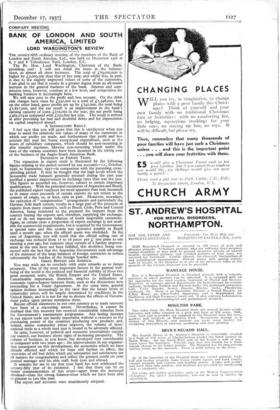COMPANY MEETING
BANK OF LONDON AND SOUTH AMERICA, LIMITED
LORD WARDINGTON'S REVIEW
THE seventy-fifth ordinary meeting of the members of the Bank of London and South America, Ltd., was held on December 14th at 6, 7 and 8 Tokenhouse Yard, London, E.C.
The Rt. Hon. Lord Wardington' Chairman of the Bank, presiding, said : I will not detail the items in the balance- sheet, as almost all show increases. The total of L79,000,000 is higher by L5,000,000 than that of last year, and whilst this, in part, is due to the slightly improved values of some of the currencies, I am glad to say that it results in a greater degree from an all-round increase in the general business of the bank. Interest and com- mission rates, however, continue at a low level, and competition for banking business is increasingly keen.
We will now pass to the profit and loss account. On the debit side charges have risen by £532,000 to a total of L1,348,000, but, on the other hand, gross profits are up by £742,000, the total being L1,827,000, and the net result is an improvement in the bank's earning capacity of some £210,000 in the year, the net profit being L462,074 as compared with £252,850 last year. The result is arrived at after providing for bad and doubtful debts and for depreciation on capital employed abroad.
A SATISFACTORY RESULT.
I feel sure that you will agree that this is satisfactory when you bear in mind the relatively low values of many of the currencies in which our profits are made, and furthermore that profit and loss account this year has borne exceptional expenditure, such as the losses of subsidiary companies, which should be non-recurring, as also transfer expenses, likewise non-recurring which under the laws of the various countries have been incurred in the taking over of the business of the Anglo-South American Bank.
EXPANSION OF EXPORT TRADE.
The expansion in export trade is illustrated by the following figures relating to the period covered by our accounts—i.e., October, 1936, to September, i937—in comparison with the preceding corre- sponding period. It may be thought that the high levels which the favourable trade balances generally attained during the past year justified a greater improvement in exchange rates than was the case. The figures as recorded are, however, subject to certain important qualifications. With the principal exceptions of Argentina and Brazil, the published export surpluses are more apparent than real, inasmuch as in many cases proceeds of certain exports do not return to the country of origin, or, at least, only in part. Moreover, nowadays, the operation of " compensation " arrangements and particularly the German Aski mark system, results in a large part of the proceeds of exports from many countries, such as Brazil, Chile, Peru and Central America, being restricted to the payment for imports from the country buying the exports and, therefore, supplying the exchange, and so do not represent balances of freely negotiable currencies. Again, in certain cases a proportion of export exchange is not avail- able for commercial requirements, but is acquired by the Government at special rates and this system was operative notably in Brazil until a month ago, when the official quota was abolished. In the case of Argentina, you will recall that the official selling rate of exchange was reduced from 17 to 16 pesos per £ just prior to our meeting a year ago, but rumours since current of a further improve- ment in the rate have not been fulfilled, this doubtless being con- nected with the fact that the Argentine Government took advantage of the existence of the large balances 6f foreign currencies to reduce substantially the burden of the foreign bonded debt.
GREAT BRITAIN AND AMERICA.
You may wish me to conclude with some remarks as to future prospects. One of the most important factors in the general well- being of the world is the political and financial stability of those two great economic units, the British Empire and the United States. Considerable importance, therefore, attaches to indications of economic rapprochement between them, such as the discussions now proceeding for a Trade Agreement. At the same time, general opinion inclines increasingly to the view that the future levels of commodity prices will be largely determined by conditions in the Unitcd States, and it is not for me to discuss the effects of Govern- ment policy upon private enterprise there.
Recent official statements in our own country as to trade recovery have been of a reassuring nature. Nevertheless, it cannot be doubted that this recovery has received considerable stimulus from the .Government's rearmament programme. Any lasting increase in our export trade can hardly materialise without a recovery in the purchasing power of the countries producing raw products and, indeed, unless commodity prices improve, the volume of inter- national trade as a whole next year is bound to be adversely affected.
In spite, however, of political and economic uncertainties outside our control, our business shows signs of increasing prosperity. The volume of business, as you know, has developed very considerably as compared with two years ago ; the improvements in our organisa- tion consequent on this development, the economies which we have already effected and which we hope still further to effect, the recoveries of old bad debts which are substantial and satisfactory are all matters for congratulation and reflect the greatest. credit on your general manager and his able staff, both here and abroad.
It remains for me to say that your bank has now celebrated the seventy-fifty year of its existence. I feel that there can be no better commemoration of this event—apart from the increased dividend—than the strong balance-sheet which we have been able to present to you this year. The report and accounts were unanimously adopted.














































 Previous page
Previous page